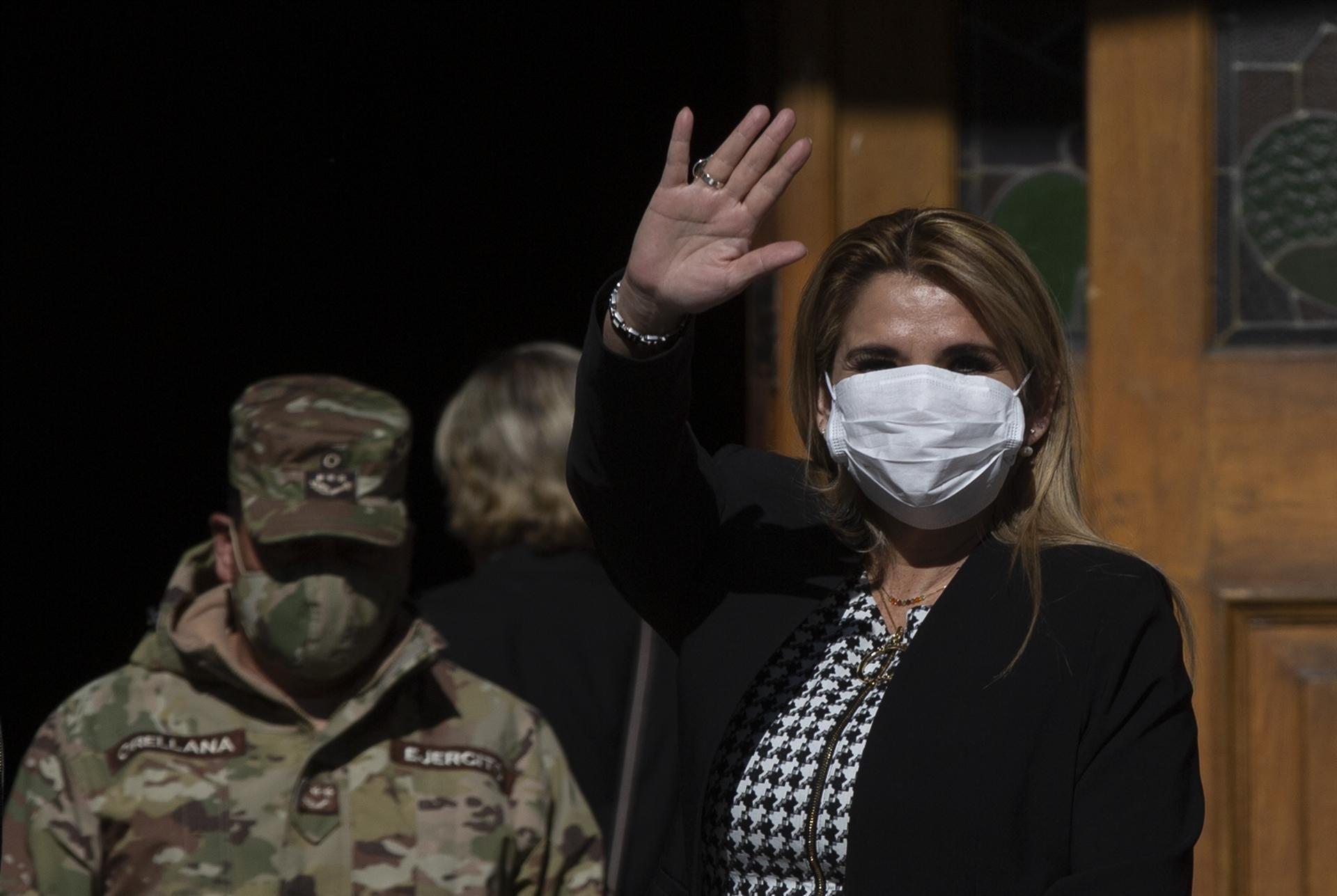
Bolivia's interim president became the latest world leader to test positive for the coronavirus on July 9, as the United States notched yet another record-breaking surge of cases while global infections and fatalities continued their relentless rise.
COVID-19 has now claimed more than 550,000 lives across the planet, and infected more than 12 million people since it first emerged in China in late 2019 -- among them Brazilian President Jair Bolsonaro, British Prime Minister Boris Johnson and now Bolivia's Jeanine Anez.
In a video on Twitter Anez said she was "fine" and would continue working from isolation. Bolsonaro said he was feeling "very well" on July 9 after announcing he had the virus earlier this week, and Johnson, who contracted the respiratory disease in March, has recovered.
Bolivia is gearing up for a general election, despite the country of 11 million recording almost 43,000 virus infections and more than 1,500 deaths.
By the time the polls are held in less than two months, the government expects there to be 130,000 cases.
The United States notched up half that figure in just one day on July 9, with 65,551 new cases recorded by Baltimore-based Johns Hopkins University -- a new high.
The country, the hardest-hit in the world by the pandemic, has a total caseload of more than 3.1 million, with 133,195 deaths.
It has seen a spike in infections in recent weeks, and health experts worry the death rate may soon follow the same trajectory.
"We're in a very difficult, challenging period right now," top U.S. infectious diseases expert Anthony Fauci said. "I would think we need to get the states pausing in their opening process," he said, although he added: "I don't think we need to go back to an extreme of shutting down."
U.S. President Donald Trump, who has publicly disagreed with Fauci, has downplayed the spike.
"For the 1/100th time, the reason we show so many Cases, compared to other countries that haven't done nearly as well as we have, is that our TESTING is much bigger and better," he tweeted.
"We have tested 40,000,000 people. If we did 20,000,000 instead, Cases would be half, etc."
The virus is still infecting new populations: the first case was recorded in northwest Syria on July 9, reviving fears of disaster if the pandemic reaches the rebel bastion's displacement camps.
And the response remains chaotic in places already in the grip of outbreaks.
Exhausted medics in Algeria pleaded for authorities to enforce hygiene rules.
"We're working non-stop. We're totally exhausted," said Dr Mohamed Yousfi, head of infectiology at the Boufarik hospital near Algiers.
Some staff are so tired they have fainted or had car accidents, he said.
Meanwhile thousands of angry Serbians protested for a third day against the government's handling of the crisis -- though the demonstrations remained largely peaceful after two nights of violence.
Fear and anxiety remains high for many. In South Africa, where the outbreak is yet to peak, authorities rushed to calm citizens after health officials said they were ready to bury more than a million people, with long rows of graves already dug.
And, in a potentially worrying discovery, scientists in Italy said there was "strong evidence" that COVID-19 positive mothers can pass the virus on to their unborn children.
Virus lockdowns have dealt a staggering blow to the global economy, and the outlook remained bleak on July 9.
The pandemic could push 45 million people from the middle classes into poverty in already economically troubled Latin America and the Caribbean, the United Nations warned.
European and U.S. stocks finished mostly lower amid lingering virus worries. Another 1.3 million U.S. workers filed for unemployment last week, government figures showed -- though the pace of layoffs has slowed.
As talk of a second wave of the virus multiplies, some of the world's most populous nations including India, Pakistan and Brazil are still reeling from their first outbreaks.
In the Middle East, hard-hit Iran reported a record single-day death toll of 221, taking its total over 12,300.
In Europe, France continued to re-emerge from the darkest days, announcing the Eiffel Tower would reopen its top level for the first time in three months. Gyms and pools are set to reopen in England later this month.
However countries farther east have found themselves plunged back into restrictions with a resurgent virus, such as Bulgaria, which banned sports fans from stadiums and shut bars and clubs.
Meanwhile the World Health Organization, under fire from Trump over its handling of the pandemic, opened an inquiry into its response on July 9, with initial findings due next year.
"The virus thrives on division but is thwarted when we unite," said WHO chief Tedros Adhanom Ghebreyesus, pleading for togetherness.